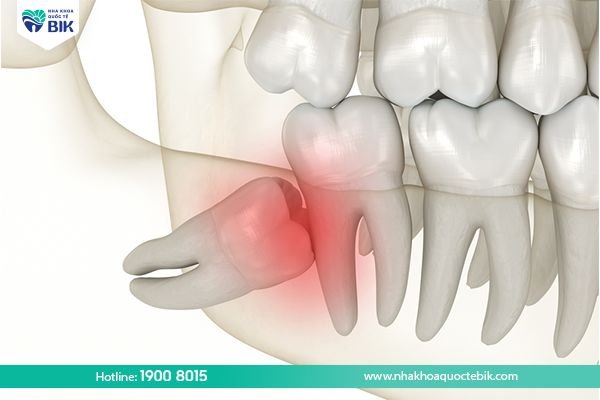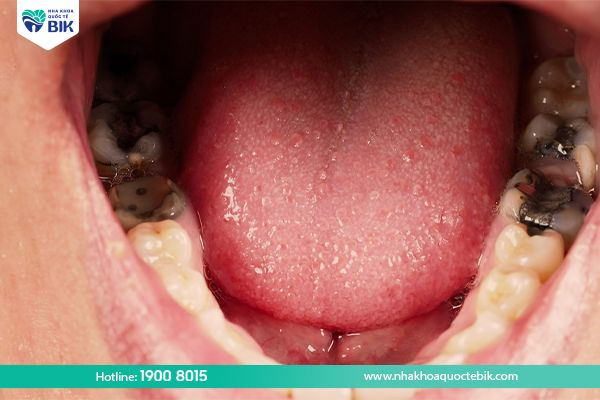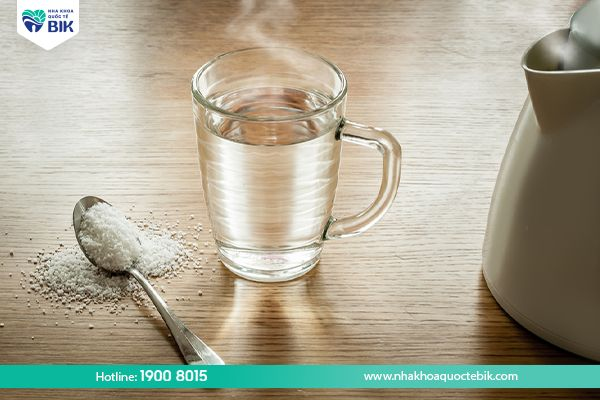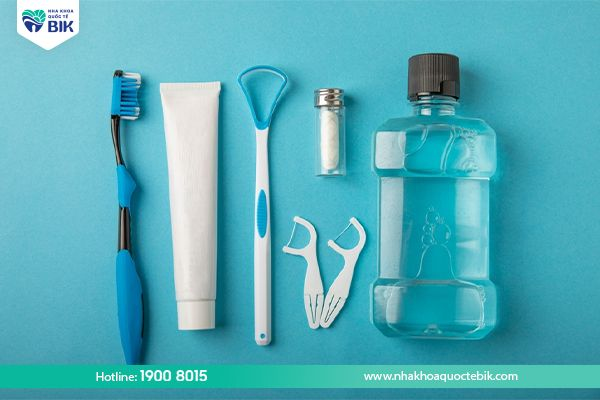Swollen gums in the lower jaw is a fairly common condition caused by many different reasons. This condition is relatively easy to recognize through the feeling of discomfort and pain during daily chewing. If not treated promptly, it will lead to other dangerous complications that directly affect the teeth as well as overall oral health.
1. Signs of swollen gums in the lower jaw
The gums are soft connective tissue surrounding the tooth roots and are light pink when healthy. Healthy gums will adhere tightly to the tooth roots and will not bleed, become inflamed or accumulate pus. In the case of swollen gums in the innermost position of the lower jaw, there will be the following signs:
– The gums in the lower jaw are swollen and turn dark red.
– There may be pus and fluid around the gums.
– The tooth at the swollen gum position may be painful, sore, making it difficult to chew.
– The mouth feels like it has an unpleasant odor due to excessive growth of bacteria.
– Swollen gums in the lower jaw may be accompanied by a sore throat.
2. Causes of swollen gums in the lower jaw
Swollen gums in the lower jaw can be due to the following causes:
2.1. Pericoronitis
Wisdom teeth are teeth that appear between the ages of 17-25 and grow in the very back of the jaw. At this time, the other teeth have stabilized and the gum tissue has grown thick and strong, so the wisdom teeth will be covered by the gums. Therefore, each time the tooth emerges, it will stimulate the gums to become red, swollen, and painful. Although this is a pericoronitis, there are still gaps that allow food plaque to accumulate, creating conditions for bacteria to grow and cause inflammation. In addition to swollen gums, this condition also causes bad breath and pus.
If the wisdom tooth grows straight, this condition will end after about 2-3 days, but if it grows crooked, the pain will last for a long time. Using pain relievers at this time will only have a temporary effect.

2.2. Gingivitis
Swollen gums in the back of the tooth can also be caused by gingivitis or periodontitis. Oral hygiene will cause plaque to accumulate into hard tartar. This is a very favorable environment for bacteria to grow, secreting toxins that cause red and swollen gums, sometimes accompanied by pus.
If gingivitis is not treated early, it will quickly turn into periodontitis, bacteria will begin to attack and destroy the entire tooth support structure, causing the teeth to loosen and even lose teeth.
2.3. Molar tooth decay
Swelling of the gums in the lower jaw can also be caused by tooth decay. This is a common oral disease in all ages due to the growth of Streptococcus mutans bacteria and the secretion of acid that destroys the minerals in tartar. This creates favorable conditions for bacteria to penetrate the dentin and pulp, causing inflammation of the entire surrounding gum tissue.

3. Is swelling of the gums in the lower jaw dangerous?
In fact, patients should not be subjective with the condition of swelling of the gums in the lower jaw gums. When swelling of the gums is accompanied by symptoms such as fever, swelling of the face, difficulty breathing or difficulty swallowing food, the infection has progressed quite dangerously.
At this time, swelling of the gums in the lower jaw gums, if not treated promptly, will lead to complications such as tooth abscess, severe infection and inflammation of the tissues surrounding the tooth. Tooth infection can spread to the jaw bone, soft tissues of the face and neck. In particular, there are cases of infection moving to the heart and brain. At this point treatment will be extremely difficult.
If the swelling of the gums in the lower jaw lasts for more than 4 days, recurs many times or shows signs of pus, persistent pain, swollen lymph nodes, etc., the patient needs to see a doctor to check the specific condition and then come up with an appropriate treatment plan.
4. Does swelling of the gums in the lower jaw affect adjacent teeth?
If swelling of the gums in the lower jaw is caused by oral diseases and is not treated promptly, it will lead to loose teeth and tooth loss. The reason is that when the gums are swollen, the gum tissue becomes less strong than before, and is no longer able to support the tooth roots to exist stably on the jaw. In addition, bacteria also attack, affecting the tooth structure.
If the cause of swelling of the gums in the lower jaw is impacted wisdom teeth, the adjacent teeth will be compressed, causing damage, infection and necrosis. Therefore, the doctor needs to extract wisdom teeth to avoid serious complications later.
5. Overcoming swollen gums in the lower jaw
To reduce swelling, pain, and discomfort when the gums in the lower jaw are swollen, you can apply some of the following methods:
5.1. Use salt water
Regularly rinsing your mouth with salt water is the most effective and economical way to reduce gum inflammation. Salt has high antibacterial and anti-inflammatory properties, and also promotes the recovery process and effectively prevents tooth decay.
Dissolve about 1 teaspoon of salt in a cup of warm water and use the mixture to rinse your mouth for 30 seconds. Do this 2-3 times a day until the inflammation is reduced.

5.2. Warm and cold compresses
Applying warm or cold compresses to the outside of the swollen gums can also make the patient feel more comfortable, without affecting daily activities.
To apply a hot compress, dip a clean towel in warm water, wring it dry, and then press the towel against your cheek for about 5 minutes. Or you can apply a cold compress by wrapping a bag of ice in a clean towel and also applying it to the outside of the cheek at the painful, swollen area for about 5 minutes.

5.3. Treating tooth decay
If the gums in the lower jaw are swollen due to tooth decay, the doctor will clean the cavity with a specialized tool. Then fill the tooth or crown it with porcelain to restore aesthetics as well as chewing ability.
5.4. Cutting the gum flap, extracting wisdom teeth
Cutting the gum flap and extracting wisdom teeth is an effective way to overcome the condition of swollen gums in the lower jaw. Not only does it reduce the pain caused by inflammation, it also avoids other dangerous complications in the long term.
6. Preventing swollen gums in the lower jaw
To prevent swollen gums in the lower jaw, you should note the following:
6.1. Proper oral hygiene
– Brush your teeth at least twice a day, especially after each meal to ensure plaque on your teeth is cleaned.
– Use a soft-bristled toothbrush with just enough force to avoid damaging the gums.
– Replace the toothbrush at least every 3-4 months to ensure that bacteria do not accumulate and cause inflammation.
– Combine the use of dental floss to completely remove food particles in between teeth.

6.2. Regular check-ups
To ensure timely treatment of general dental problems, you should have a dental check-up every 6 months at reputable, high-quality facilities. At this time, the doctor will proceed to scrape tartar, check the general oral health and treat any oral diseases if any.
So swollen gums in the lower jaw is quite a dangerous condition if not treated promptly and properly. Therefore, as soon as you discover signs of swollen and painful gums, you should go to a reputable dental clinic to be examined to find the specific cause and then carry out treatment measures according to the instructions of a specialist.


















